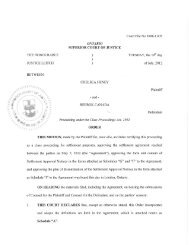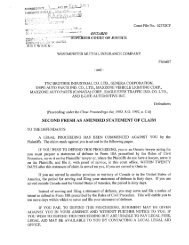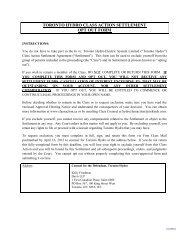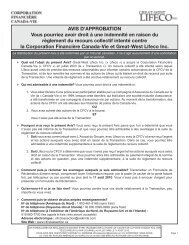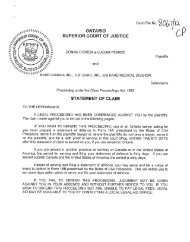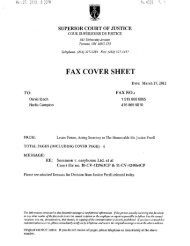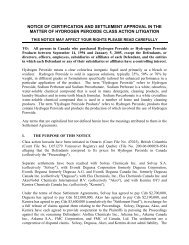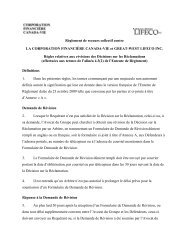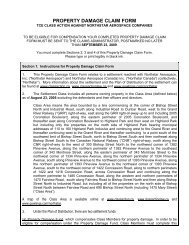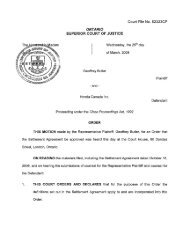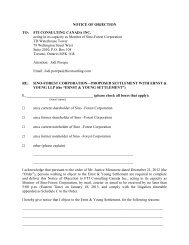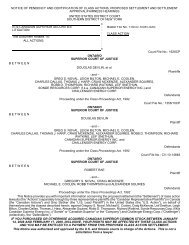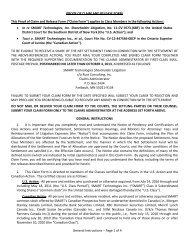Gariepy v. Shell Oil Co. - Classaction.ca
Gariepy v. Shell Oil Co. - Classaction.ca
Gariepy v. Shell Oil Co. - Classaction.ca
Create successful ePaper yourself
Turn your PDF publications into a flip-book with our unique Google optimized e-Paper software.
"<strong>Co</strong>mmonality tests have been a source of confusion in the courts. The commonalityquestion should be approached purposively. The underlying question is whetherallowing the suit to proceed as a representative one will avoid dupli<strong>ca</strong>tion of factfindingor legal analysis. Thus an issue will be `common' only where its resolutionis necessary to the resolution of each class member's claim. It is not essential thatthe class members be identi<strong>ca</strong>lly situated vis-à-vis the opposing party. Nor is itnecessary that common issues predominate over non-common issues or that theresolution of the common issues would be determinative of each class member'sclaim. However, the class members' claims must share a substantial commoningredient to justify a class action. Determining whether the common issues justifya class action may require the court to examine the signifi<strong>ca</strong>nce of the commonissues in relation to individual issues." 56 The following factors <strong>ca</strong>n be drawn from the Chief Justice's observation:* the resolution of the common issues must be necessary to each member'sclaim;* the common issues need not predominate over non-common issues nor doesthe resolution of the common issues need to be determinative of eachmember's claim;* the common issues must be a "substantial" common ingredient of eachmember's claim;* whether the common issues justify a class action involves an examination ofthe "signifi<strong>ca</strong>nce" of the common issues in relation to the individual issues. 57 The defendants assert that the common issues are not, in fact, common at all. They contend thateach plumbing system would have to be examined separately in order to make a properdetermination of liability. They say that whether polybutylene is appropriate for use in potable waterplumbing systems depends on the particular environment in which it is to be installed. For example,it involves a consideration of the natural quality of the water, the level of chlorine in the water, thetemperature of the water and even the prevailing climate in which the system is installed. It shouldbe noted, in this regard, that the evidence establishes that the quality of water, as well as the levelsof chlorine found in water, varies considerably around Ontario. The defendants also say that thereare any number of reasons why a given plumbing system might leak including improper installationor the use of incompatible components in the system. <strong>Co</strong>nsequently, the defendants contend that theliability inquiry will quickly devolve into a need for a system by system examination. 58 I accept the defendants' point that there will be a number of individual issues that will need tobe addressed in order to arrive at the ultimate determination of whether any given class member isentitled to relief. However, that is not the test for the common issues requirement as is made clearby the Chief Justice's observation above. Rather, the test is whether the determination of thecommon issues will signifi<strong>ca</strong>ntly advance the litigation. 59 The difficult issue, then, is to determine what constitutes "signifi<strong>ca</strong>ntly" advancing thelitigation? Should it be determined through a comparison of the number of issues to be resolved in



